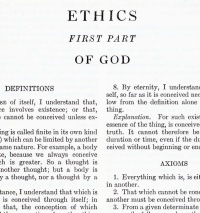Text
From The Art and Popular Culture Encyclopedia
(Difference between revisions)
| Revision as of 16:29, 14 March 2008 Jahsonic (Talk | contribs) (→See) ← Previous diff |
Current revision Jahsonic (Talk | contribs) |
||
| Line 1: | Line 1: | ||
| + | [[Image:Ethics by Spinoza.jpg|Spinoza's|thumb|right|200px|By virtue of his [[magnum opus]], the posthumous ''[[Ethics (book)|Ethics]]'', [[Spinoza]] is considered one of [[Western philosophy|Western philosophy's]] definitive ethicists.]] | ||
| + | [[Image:The Big Swallow.jpg|thumb|left|200px|This page '''{{PAGENAME}}''' is part of the [[linguistics]] series.<br> | ||
| + | <small>Illustration: a close-up of a [[mouth]] in the film ''[[The Big Swallow]]'' (1901)</small>]] | ||
| {{Template}} | {{Template}} | ||
| - | A [[text]] is a [[written]] passage consisting of [[multiple]] characters, symbols or sentences; a book, tome or other set of writings. In [[language]], text is something that contains words to express something, regarded as an object of [[critical]] analysis. | + | '''Text''' may refer to: |
| + | * the representation of [[written language]] | ||
| + | * [[Text (literary theory)]], a concept in literary theory | ||
| + | * [[Textbook]], a standardized instructional book | ||
| + | * Another name for a [[Literature|literary work]] | ||
| - | Specific literary theories are distinguished not only by their methods and conclusions, but even by how they define "text." For many, "texts" means "literary (i.e. 'high' art) texts" (see literature). But different principles and methods of literary theory have been applied to non-fiction, pop fiction, film, historical documents, law, advertising, etc. In fact, some theories (e.g. structuralism) treat cultural events like fashion, football, riots, etc. as "texts." | + | == '''Text''' may also refer to == |
| - | + | ||
| - | In [[literary theory]] a text is the object being studied, whether it be a novel, a poem, a film, an advertisement, or anything else with a linguistic component. The broad use of the term derives from the rise of semiotics in the 1960s and was solidified by the later cultural studies of the 1980s, which brought a corresponding broadening of what it was one could talk about when talking about literature; see also ''[[discourse]]''. | + | |
| - | == '''Text''' may refer to == | + | |
| In '''books''': | In '''books''': | ||
| Line 20: | Line 24: | ||
| * a piece of [[writing]] | * a piece of [[writing]] | ||
| *[[Textual criticism]] | *[[Textual criticism]] | ||
| + | ==Etymology== | ||
| + | From Latin ''textus'', perfect passive participle of ''texō'' (“weave”). | ||
| + | |||
| == See == | == See == | ||
| - | *[[Roland Barthes]]'s ''[[From Work to Text]]''. | + | *[[Roland Barthes]]'s ''[[From Work To Text]]''. |
| *[[Intertextuality]] | *[[Intertextuality]] | ||
| *[[Literature]] | *[[Literature]] | ||
| + | *[[There is nothing outside of the text]] | ||
| {{GFDL}} | {{GFDL}} | ||
Current revision

By virtue of his magnum opus, the posthumous Ethics, Spinoza is considered one of Western philosophy's definitive ethicists.

This page Text is part of the linguistics series.
Illustration: a close-up of a mouth in the film The Big Swallow (1901)
Illustration: a close-up of a mouth in the film The Big Swallow (1901)
|
Related e |
|
Featured: |
Text may refer to:
- the representation of written language
- Text (literary theory), a concept in literary theory
- Textbook, a standardized instructional book
- Another name for a literary work
[edit]
Text may also refer to
In books:
In unit of study:
- hermeneutics
- philology
- Semiotics, the study of signs and symbols, both individually and grouped into sign systems
- cultural studies, the unit of discourse
In writing:
- a piece of writing
- Textual criticism
[edit]
Etymology
From Latin textus, perfect passive participle of texō (“weave”).
[edit]
See
Unless indicated otherwise, the text in this article is either based on Wikipedia article "Text" or another language Wikipedia page thereof used under the terms of the GNU Free Documentation License; or on research by Jahsonic and friends. See Art and Popular Culture's copyright notice.

